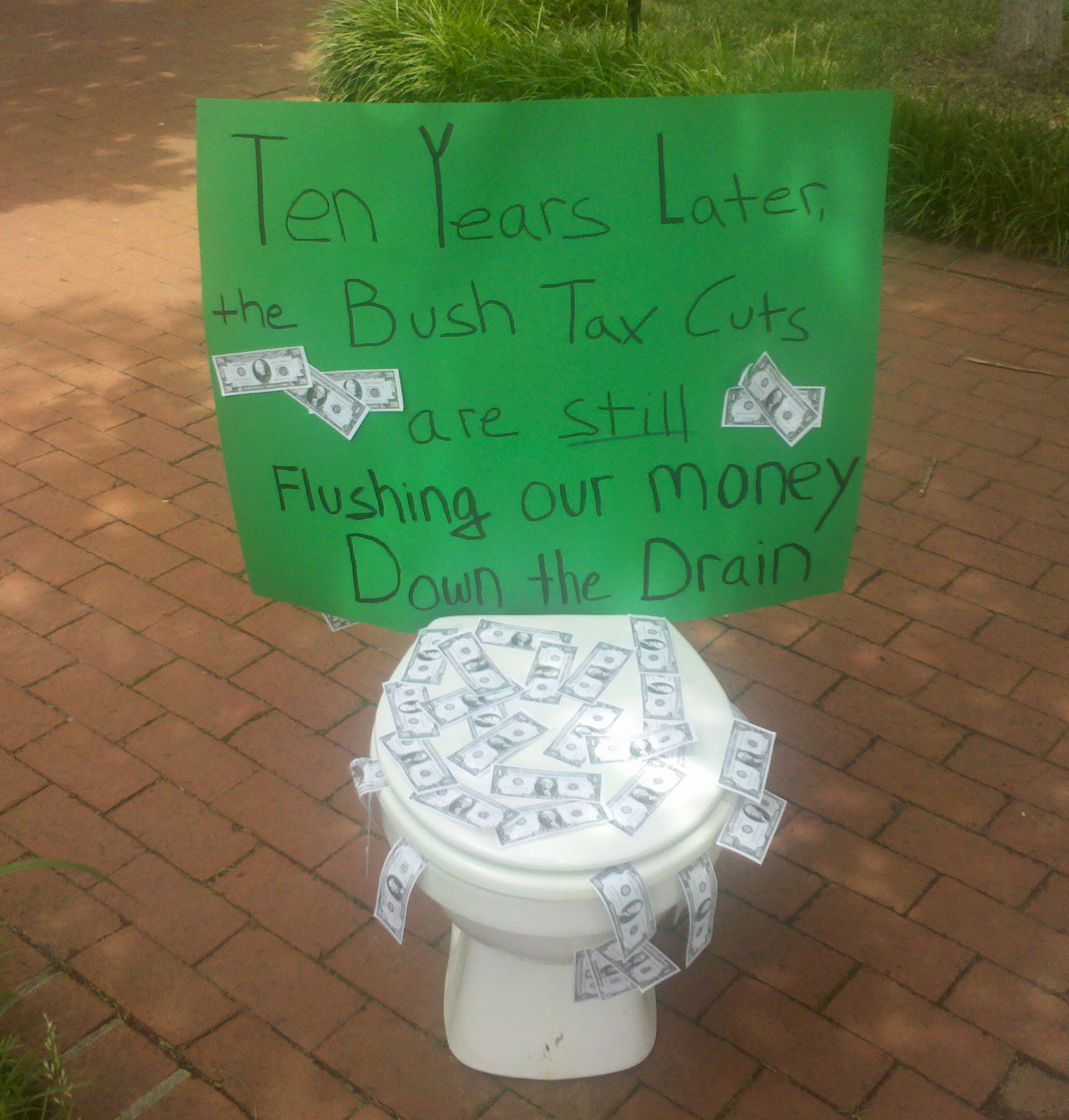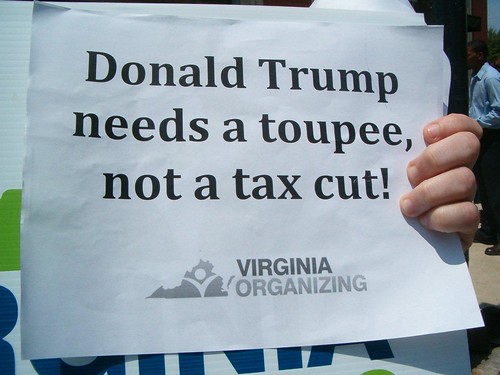
As debt ceiling debate continues, we are marking the tenth anniversary of the policy that created most of the federal budget gap: the Bush tax cuts. On July 7, 2001, George W. Bush signed into law a $1.35 trillion tax cut that primarily benefited the wealthiest Americans while leaving our country with massive debt. Virginia Organizing supporters gathered today in front of Rep. Robert Hurt's office in Danville and the Fredericksburg Public Library to bring attention to the terrible effects the Bush tax cuts have had in Virginia. Participants shared their experiences over the past 10 years and what they think the money could have been used for locally instead. Residents also expressed their concerns for Rep. Hurt's, Rep. Rob Wittman's and their colleagues', recent vote in support of Rep. Paul Ryan's controversial budget proposal to end Medicare, as we know it. Tuesday's events were part of dozens taking place around the country as supporters of Medicare, Medicaid and Social Security protest efforts to cut essential services while giving trillions of dollars in additional tax cuts, exemptions and loopholes to the super-rich and to corporations. In Fredericksburg, participants like Joe Katz, flushed play money down a toilet, to represent the valuable capital that went to millionaires instead of schools, health care, police and libraries. "I believe there's no excuse for our leaders in Washington to cut our Medicare, Medicaid, or Social Security so that millionaires can have huge tax breaks." "The working people of Virginia did not fire Americans and send their jobs overseas. We didn't take absurd risks on Wall Street. We didn't get a bailout from the government or make the housing market implode. The wealthy corporations and banks did that, and we're not going to give up our Medicare, Social Security, and other lifelines so that the people who ruined our economy can keep avoiding taxes," added Katz. 
David Harrison of the Virginia Organizing Danville Chapter joined other residents in front of Rep. Hurt's office today in Danville. "I came out today to highlight the fact that our country's descent into debt began in 2001 with a choice, not a crisis. I'm tired of the conservatives in Washington like Rep. Hurt, making the elderly, poor and middle classes pay for tax cuts that the wealthy do not need. How can leaders in Congress claim they are serious about reducing the deficit and continue to give tax breaks to the rich?"
"We don't necessary have a spending problem, we have a revenue problem. The country needs the top two percent and major corporations to pay their fair share in taxes. By closing corporate loop holes and ending the Bush tax cuts, the country would be able to pay for vital services working Americans need," added Harrison.
The Economic Growth and Tax Relief Reconciliation Act of 2001 (the first of a series of Bush-era tax changes) was enacted on June 7, 2001. Ten years later, the Bush tax cuts have exacerbated trends of widening income inequality, accompanied the weakest economic expansion since World War II, and turned budget surpluses into deficits. Ten years, later, it's hard to find any evidence that the Bush tax cuts created the prosperity promised by their proponents. Virginia's official unemployment rate in June 2001 was 3.1 percent. Today the seasonally adjusted rate is almost double that, 6.1 percent. Nationwide, the unemployment rate was 4.7 percent. Today it is hovering around 9 percent.
As detailed in a new Economic Policy Institute policy memorandum, these tax cuts were heavily targeted toward the wealthy at the expense of middle class families, poorly designed as an economic stimulus, and costly-significantly more so than advertised.
According to new figures released by Citizens for Tax Justice, the wealthiest one percent of Virginia residents, who will have an average income of $1.3 million in 2013, would receive an average tax cut of $70,149 in that year.
In contrast, the poorest 60 percent of the state's residents, with an average income of $31,828, would receive a tax cut of just $569 in 2013. To put that number into perspective, the average American household pays $300 a month just to fill their gas tank.
Enough is enough. Our economy is in tatters and the middle class is disappearing. Yet some in Congress are at it again. They want to give even larger tax cuts to corporations and the super-rich while slashing essential services, health care environmental protections and attacking public employees. Congressman Paul Ryan calls this approach a pathway to prosperity. We call it a road to ruin. We must end the Bush Tax Cuts and invest in our future.

